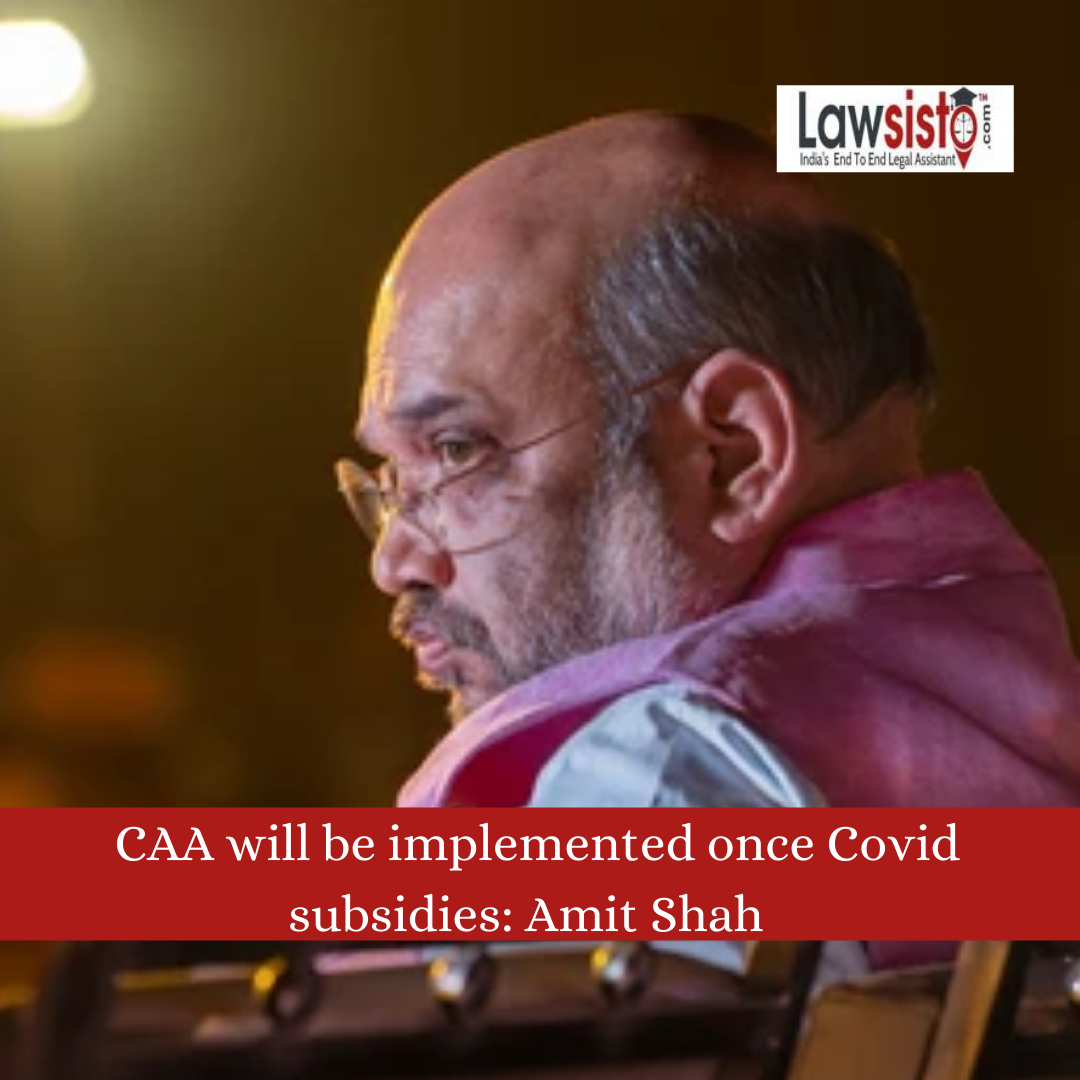Latest News
CAA will be implemented once Covid Subsides: Amit Shah

Union Home Minister has announced at a rally in new Jalpaiguri that Citizenship Amendment Act (CAA) will be implemented once the covid- 19 pandemic subsidies. Exactly a year after BJP’S thrashing in the state assembly elections, the shah is on his first visit to West Bengal. Retracting the refugee-infiltration issue back into the political discourse ahead of the 2024 Lok Sabha Election, Home Minister alleged the Trinamool government of allowing infiltration while the Modi government at the centre was committed to granting identification to the refugees. He stated that- Mamata Banerjee’s government doesn’t want us to implement Citizenship Act. They desire infiltration to continue. But they won’t let them accomplish their agenda. So, Let the covid over we will implement CAA. Shah also accused the state government of Bengal of trying to divide the Gorkhas, Adivasis and Rajbanshis in north Bengal by allowing infiltration to alter the region’s demography. While Addressing the Gathering of BSF personnel at Haridaspur, North 24 Parganas, Shah raised the issue of Smuggling and infiltration. He propounded that- ‘It is hard to prevent infiltration and smuggling without the help of the local administration. I want to make sure that a political environment favourable to the BSF’s functioning is soon created here.’ Among the states, Bengal has strongly opposed the centre’s step to extend the BSF’s Jurisdiction from 15km to 50km inside the border. Shah said to the New Jalpaiguri ‘We acknowledged the Mandate of the Bengal Polls. People gave a third term to Didi But, tell me If Syndicated or Cut-money have ended in Bengal?? TMC Government had made the state Indigent. In 2011 Bengal was seventh among all states and now it is in 23rd spot.’ Amit Shah further said I want to thank the people of North Bengal for raising BJP’s tally from 3 to 77 in the Bengal assembly Until TMC’s Tyrannical rule will not uproot, the BJP won’t rest. The CAA was at the heart of immense protests in parts of the country in late 2019 and early 2020, months before the Covid outbreak stimulating lockdowns and other restrictions. The Law was comprehensively criticized as discriminatory as it makes religion a facet of nationality and seeks to fast-track citizenship to non-Muslim immigrants who came to India before 2015from from Bangladesh, Pakistan and Afghanistan. According to the critic's Laws along with the planned National Register of Citizens NRC will cause lakhs of the Muslims to lose their citizenship. However, the centre submits that No Indian will lose their Citizenship.
Citizenship (Amendment) Act, 2019
The Citizenship (Amendment) Act, 2019 was passed by the parliament on 11th December 2019 with as many as 125MP votes in Favor and 99 against The CAB was tabled and passed in the Lok Sabah’s winter session on 9th December 2019. It amended the citizenship Act 1955 by providing a fast track to Indian citizenship for persecuted religious minorities from Afghanistan, Bangladesh and Pakistan who are Hindus, Buddhists, Jains, Parsis, Sikhs and Christians and arrived in India before the end of 2014. The Amendment does not give such eligibility to Muslims from these countries where Muslims are in Majority. The Amendment has been criticized as Discriminating based on religion specifically for excluding Muslims.
The Bill mainly aims to change the definition of illegal migrants. Illegal migrants can be defined as one who enter India with forged documents or alien enemies or doesn’t have a valid passport. The person who lives beyond the validity of the Visa is also regarded as an illegal migrant according to the Indian Citizenship Act 1955. BJP, which leads the Indian Government, had promised in the previous election Manifesto to offer Indian Citizenship to members of persecuted religious minorities who migrated from neighbouring countries. Migrants who entered India by 31 December 2014 and had suffered religious persecution in their country of Origin were made eligible for Citizenship under this Amendment Act. For acquiring the Indian Citizenship by Naturalization for these migrants the requirement has been relaxed from 12 years to 6 years. CAB exempts certain areas in the North-East. It would not apply to tribal areas of Assam, Meghalaya, Mizoram and Tripura. This means that whole of Meghalaya and Parts of Assam including Arunachal Pradesh, and Nagaland would stay out of the jurisdiction of the Citizenship Amendment Bill. The Bill will also not apply to the areas under Inner Line permits under the Bengal Eastern Frontier Regulation, 1873. According to the Amendment, A foreign can register as an OCI if they or their Spouse is of Indian Origin. OCI holders are entitled to enjoy the benefits like, Right to travel to India and work and Study in the country under the Amendment. The Act also provides that the central Government can also cancel the registration of OCI on certain grounds.



































































































